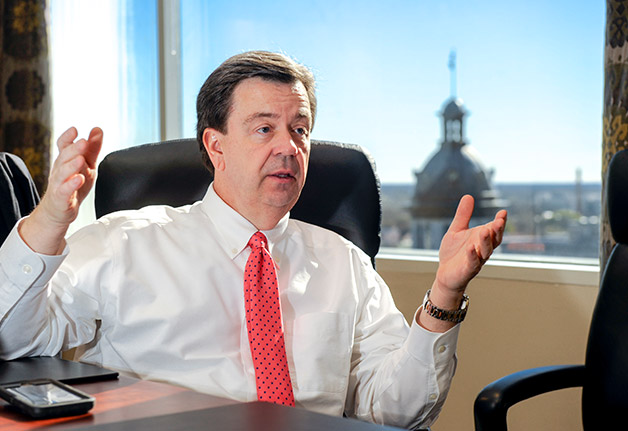The legal profession seems to be in a state of change. Fewer undergraduates are applying to and entering law school. Law schools are in decline as well, and some are cutting faculty and considering condensing the curriculum to two years instead of three. At the same time, fewer civil cases go to trial, and fewer attorneys try cases.
John Cuttino ’79, an attorney and shareholder with Gallivan White Boyd P.A. in Columbia, S.C., isn’t sure where the profession is heading, but as the president of the DRI-The Voice of the Defense Bar, “the world’s largest and premier organization of defense attorneys and in-house counsel,” he spends considerable time thinking, writing and talking about it.
“A lot of things are going on with the practice of law and the profession in general, not just in my area of practice,” says Cuttino. “It used to be you were hired by a firm, stayed with them, grinded it out and moved up the ranks, but the game has changed a lot. At DRI, we watch closely, and often advocate on changes affecting the profession and the delivery of legal services.”
Cuttino took office with DRI, based in Chicago, Ill., in October 2016 and will serve for a year. It’s not quite a full-time job, but it’s close with frequent travel, meetings and speaking engagements across the country. He also writes articles and does interviews on the changes in the profession: from the ability of non-lawyers to render legal services and to have ownership of law firms, to the cost of a legal education and the associated student debt that comes with it.
“DRI started out as an educational organization in 1960. The law is always changing, and lawyers need to be updated on those changes. Education has been a large part of DRI’s mission, but we offer a lot more than legal education,” says Cuttino. DRI also is committed to improving and seeking balance in the justice system, assisting members in dealing with the economic realities of the defense law practice and encouraging ethical practice and social responsibility.
Cuttino tried and won his first case in Darlington County in 1983, not long after serving a judicial clerkship. After 34 years he still loves the practice of law and is quick to say that even with the uncertainty in the field, a legal education offers great training for a variety of professions. He also says that Wofford graduates are ideally suited for law school or a legal career.
“There is an almost unbelievable number of Wofford alumni who are very successful in this profession, and I’m extremely proud of that,” says Cuttino. “That’s not a coincidence. Law schools are attracted to people with a broad liberal arts background, with science degrees, math degrees or foreign language degrees. You don’t have to major in government to be successful in the field.”
As far as the future of the legal profession goes, Cuttino says the next chapter hasn’t been written yet. “Still, I would go back to law school in a heartbeat,” he says. “Anything that stretches your mind and broadens your thinking is a huge advantage in any career.”
by Jo Ann Mitchell Brasington ’89
